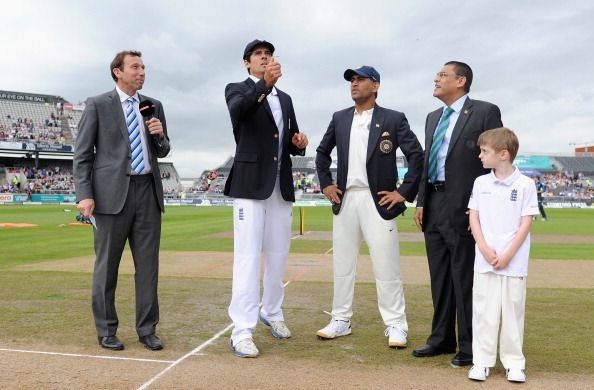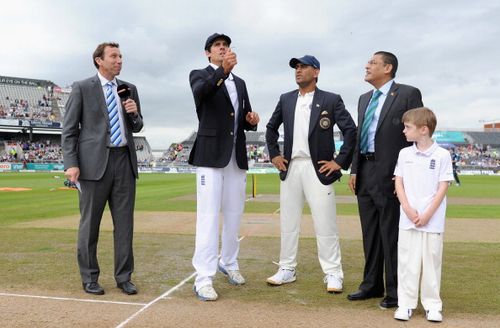
England v India 2014: India in need of change of guard

What an amazing turnaround by both England and India, in a few short weeks, albeit in opposite directions. You just have to love the sport for that.
A few short weeks ago, every expert in England was baying for Alastair Cook's blood, questioning his captaincy, his batting form and the contribution of his senior teammates. Respond he did, as did the senior players in the new-look England side. Ian Bell, James Anderson and Stuart Broad have shifted into a higher gear since Lord’s, alongside match-defining performances from the young upcoming stars like Gary Balance, Joe Root and Moeen Ali. England have transformed into a team that can do no wrong, in a very short space of time. The catches spooned on the placid pitch of the last day at Lord’s, in a meek surrender to short-pitched stuff from Ishant Sharma, are already a distant memory.
England outplayed India in all departments at Old Trafford, wrapping up the game in less than three days. While heaps of credit must go to the home team, it was the manner of the defeat, the meek surrender that was rather shocking.
The toss factor
India started well with MS Dhoni winning a crucial toss. But it was all downhill from the point the coin landed on the grass. The Indian think-tank read the conditions completely wrong, supposedly taking a cue from the previous games, electing to bat first on a hard seaming track with heavy overhead conditions. Surely, Cook would have appreciated the decision, sparing him the pressure of donning his pads on first up.
With experienced men around like Dhoni and Duncan Fletcher, it was a baffling call. While Broad picked up a six-for, it was Anderson outswinging the new ball like a leg break at 85 mph that highlighted very quickly the folly of the bat first decision. In a matter of minutes, India were 4 down for 8, and it was going to be tough to get back.
But instead of showing a will to battle out sessions, India went downhill from those early minutes, finding new lows in all departments and nearly all sessions. Even the concluding sessions of the Test left one wondering if the Indian batsmen were the only men unaware of the storms expected to sweep Manchester the following day. While one was left with many points to ponder, there were a few that stood out for me.
Points to ponder
The Indian batsmen demonstrated that they can make any bowler a hero, even a part-time finger spinner on a seaming track, if they decide. Taking absolutely nothing away from Moeen Ali, who is improving every day and has made significant contributions to his team's cause with bat and ball in this series already, he is not really a match-winning quality spinner. Pre-determined plans to attack him proved expensive with several soft dismissals, as in the previous Test. The logic of trying to hit Moeen out of the attack, and gifting away wickets in final few sessions, was truly confusing. The pitch was not a fifth day track, and having a lesser threat from one end is not such a bad thing, especially when playing out time is the goal.
Another point that has been rather irksome is the Indian slip catching. England were kind enough to run a master class (on the side), on how to stand properly and catch in the slips. Yes, crouching low, not like royalty, hands resting on knees when the ball is bowled: a simple basic that has been forgotten by the Indian slippers throughout this series. With a large fleet of coaches and experts observing and advising, wonder how such basics can be ignored at the highest level. The catches by Cook, Bell and Chris Jordan in the Old Trafford Test proved that you just have to get the basics right, to take sharp chances.
The final point to ponder is that several Indian batsmen seemed to believe that mindless aggression could get past a tough situation, like in a T20 spurt, turning the game around with a few big hits. I've never really agreed with the view that T20 was doing harm, but I'm reluctantly changing views now. There is merit in different leadership and personnel for the Test format. Australia, England and South Africa have got it right. Like the great Clive Lloyd once opined, “Test cricket is a true test”. While batting first was a blatant error, India demonstrated inability in all departments through the two and half days, pretty much handing over the game, with a total absence of grit, application, determination or consistency.
Change in attitude
It was an appalling all-round performance, and that is the only way to sum it up. Well, like me, if you thought it couldn't get any worse than the 2011 tour of England for Indian Test cricket.....it can, and it just did. This series has rapidly dwindled to a no-contest. The quality of batting, catching, bowling, pretty much all the big and small things, exhibited by the Indians have been well below par in this Test match. Unfortunately, the absence of DRS only adds further frustration, thanks to the terms of the series agreed by the BCCI.
There seem to be no easy answers in sight, either, simply because this nature of performance cannot be blamed on the individual underperformance alone or selection errors. The return of Ishant Sharma in the next game will not be adequate to inject the nerves and determination required to bounce back. If India want to rebuild, serious rethinking and a big change will be required, in the attitude and the will to fight. Change of leadership must be on the cards after this series, undoubtedly.
Having said all that, more power to Cook and his men for achieving an emphatic turnaround not only within this series, but after a long string of failures since their last Ashes tour. They have successfully put the absence of star players of their recent past well and truly behind them. This English team can only get better from here.